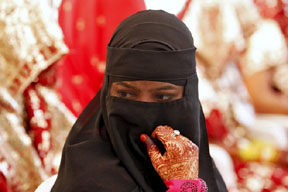 NEW DELHI: Widening its consultation on the contentious issue of uniform civil code, the Law Commission has asked all national and state political parties to share their views and plans to invite their representatives for interaction on the subject.
NEW DELHI: Widening its consultation on the contentious issue of uniform civil code, the Law Commission has asked all national and state political parties to share their views and plans to invite their representatives for interaction on the subject.
The panel has sent a questionnaire on the subject to the parties and asked them to send their views by November 21.
Should the practice of triple talaq be abolished and whether a uniform civil code should be optional, the Law Commission questionnaire had on October 7 asked the people seeking their response on these sensitive issues, broached perhaps for the first time.
The Election Commission has recognized seven parties at the national level and 49 at the state level. The seven national parties are BJP, Congress, BSP, NCP, CPI, CPI (M) and Trinamool Congress.
“The Commission, after several rounds of deliberations, has formulated a questionnaire to understand what does the general public feel about the uniform civil code.
“Since political parties are the backbone of any successful democracy, their opinion, not only with regard to the questionnaire, but also any other input pertaining to this aspect, is very important,” law panel chairman Justice (Retd) B S Chauhan has written to heads of all political parties.
In an effort to have maximum consultation on the issue, he has asked them to communicate their views on the subject.
The Commission has said that it would also invite representatives of political parties at a later date to interact with them on the controversial subject.
“Your cooperation would go a long way in assisting the commission to bring out an impeccable report on the uniform civil code,” he said.
A few days ago, Chauhan had urged chief ministers to use their influence to encourage minority groups, political parties and even government departments to respond to its questionnaire.
In a letter to all chief ministers, Chauhan had asked them to “encourage” various stakeholders in their states such as minority groups, political parties, NGOs, civil society initiatives and even government departments and agencies to share their views and interact with the panel.
In an appeal issued along with the consultation paper, the Commission had said the objective behind the Endeavour is to address discrimination against vulnerable groups and harmonies the various cultural practices.
It has assured the people that the “norms of no one class, group or community will dominate the tone and tenor of family law reforms”.–PTI






